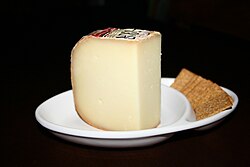Ossau-Iraty
| Ossau-Iraty | |
|---|---|
 | |
| Country of origin | France |
| Region, town | French Basque Country |
| Source of milk | Ewe |
| Pasteurized | No[1] |
| Texture | Medium firm |
| Aging time | 80 or 120 days minimum, by weight[2] |
| Certification | AOC 1980, PDO |
| Named after | Pic du Midi d'Ossau, Irati Forest |
Ossau-Iraty is an Occitan-Basque cheese made from sheep's milk.
Origin[edit]
Ossau-Iraty or Esquirrou[3] is produced in south-western France, in the Northern Basque Country and in Béarn. Its name reflects its geographical location, the Ossau Valley in Béarn and the Irati Forest in the Basque Country.[4]
AOC status[edit]
It has been recognized as an appellation d'origine contrôlée (AOC) product since 1980. It is one of three sheep's milk cheeses granted AOC status in France (the others are Roquefort and Brocciu). It is of ancient origin, traditionally made by the shepherds in the region.[5]
Production[edit]
Production techniques are very much in the essence of old world methods whereby the sheep still graze mountain pastures. The milk must come from the breeds Basco-Béarnaise, Red-face Manech, or Black-face Manech. This is an uncooked cheese made through pressing. When offered as a farm-produced cheese (known as fromage fermier, fromage de ferme or produit fermier) the AOC regulations stipulate that only raw, unpasteurized milk be used.[6][7]
Historically production has been:
- 3,067 tonnes (in 2003)
- 60 producers (in 2003)
- 8 manufacturers: private industries and cooperatives (in 1998)
- 2,045 milk producers (in 1998)
Description[edit]
According to the official description, the cheese crust is yellow-orange to gray, and the body color ranges from white to cream depending on how it has been matured. It is smooth, creamy and firm, and may have some small eyes (openings).[8]
See also[edit]
References[edit]
- ^ "Ossau-Iraty". Archived from the original on 2009-09-06. Retrieved 2010-02-18.
- ^ "Appellation d'Origine definition – Ossau-Iraty" (PDF). Institut national de l'origine et de la qualité (INAO). 31 October 2011. Archived from the original (PDF) on 30 June 2014.
5.3.6 - La durée minimale d'affinage dans l'aire d'appellation est de 120 jours pour les fromages de 4 à 7 kg, et de 80 jours pour les fromages de 2 à 3 kg.
- ^ Boyer, Antoine. "Au Fromager de Rungis is a cheese wholesaler".
- ^ Anthony Peregrine (July 20, 2002). "France: Hard cheese for losers in the war of the noses". Daily Telegraph. Ossau-Iraty. Retrieved 2014-02-27.
- ^ Fletcher, Janet (2003-01-09). "Ossau-Iraty an earthy delight from France's Basque region". The San Francisco Chronicle.
- ^ "Appellation d'Origine definition – Ossau-Iraty" (PDF). Institut national de l'origine et de la qualité (INAO). 31 October 2011. Archived from the original (PDF) on 30 June 2014.
- ^ Fletcher, Janet (2006-02-23). "Factories make sheep's milk taste sweet". The San Francisco Chronicle.
- ^ "Appellation d'Origine definition – Ossau-Iraty" (PDF). Institut national de l'origine et de la qualité (INAO). 31 October 2011. Archived from the original (PDF) on 30 June 2014.
La pâte a une couleur variant du blanc ivoire au crème ambré en fonction de l'affinage. Elle est lisse, ferme à onctueuse. Elle peut présenter quelques ouvertures de petite taille. La croûte présente une couleur allant du jaune orangé au gris.
